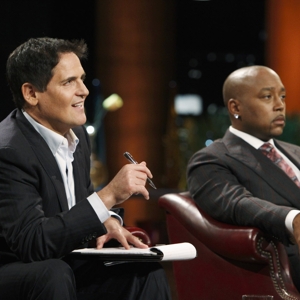
Mark Cuban published his own ebook in 2012
I’m always watching for Kindle references on TV, especially talk about how ebooks might take the place of books. But the last place I ever expected to hear that was on the season premiere of “Shark Tank.”
If you haven’t seen the show, five rich investors listen to pitches from start-up business owners who are hoping to earn some venture capital (in exchange for a stake in their company). But Friday night, the business was simply a ghost writer — and he believed he could make millions by writing and publishing the biographies of businessmen. It sounded crazy, until he revealed that he’d already written something like 100 “vanity” books. And he was charging up to $35,000 for each book (which included a run of printed copies).
The books looked slick, and investor Daymond John asked an interesting question: why aren’t you marketing this service to ordinary people? (“Because ordinary people don’t have $35,000 to spend on a book!” screamed my girlfriend at the TV!) The writer gave an answer that was much more nuanced, but essentially making the same point — that not everyone has the quality for a book. I think he danced around the specifics, but as I remember it, he said that he didn’t feel he could produce a good book for just $10,000. And that he was telling his customers that instead of expecting profits from the sales of their book, they should use them as a marketing tool, to promote their other businesses.
The presenter had a good patter, and the investors all seemed to like him, but one by one, they’d started dropping out of the bidding. Soon there was just one left — the newest panelist, the unpredictable billionaire Mark Cuban (who owns the Dallas Maverick’s basketball team, as well as the Landmark Theatre movie chain). He seemed genuinely intrigued, but then he raised a devastating critique. You haven’t mentioned the way the book industry is changing — meaning specifically the Kindle, or ebooks, or the self-publishing revolution.
It was a poignant moment. Ghost writer Michael Levin had already proven his success in the world of printed books. (According to his web site, he’s ghost-written the biographies of sports commentator Pat Summerall and Dave Winfield, a former outfielder who’s now the vice president of the San Diego Padres.) And at one point, the panel pointed out that the writer was doing what nearly every other writer had dreamed of but failed to do: he was actually making a ton of money. But unfortunately for the ghost writer, Mark Cuban had just published his own ebook — which was called “How to Win at the Sport of Business: If I Can Do It, You Can Do It.” So he was going to be skeptical about investing in a company which produces nothing but books in print.
Now the ghost writer was called out on nationwide TV, in front of a panel of cynical investors. (“If this was 1995, I would’ve said yes,” explained Mark Cuban.) As his moment of glory turned to unanimous rejection, the ghost writer came up with one more clever — or desperate — last hurrah. I saw him as an unheralded giant — an invisible kingpin — in the dying world of printed books. And maybe he just didn’t want to admit that the world was really changing. Instead, he told the panel that ebooks would only increase the relevance of his business model. Since then printed books would become even more of a curiosity — a quaint and intriguing artifact that businesses would want even more!
And the last word seemed to belong to those same ordinary people who could never afford his ghost-writing services anyways.
“Dude was clueless as hell…” posted one viewer on Twitter. And another tweeted a condensed version of Cuban’s reason for declining the investment opportunity: “no future in a hard copy book, like a weightlifting snowman.” (Which means that no matter how impressive it is, it’ll still vanish before you know it!) And ultimately, soon even Mark Cuban himself had turned up on Twitter, confirming that that’s why he’d left behind the world of printed books.
“exactly why i publish my book as an ebook.”
Check out Mark Cuban’s Kindle ebook, “How to Win at the Sport of Business: If I Can Do It, You Can Do It!”
Great post. Another reason I like Mark Cuban :D